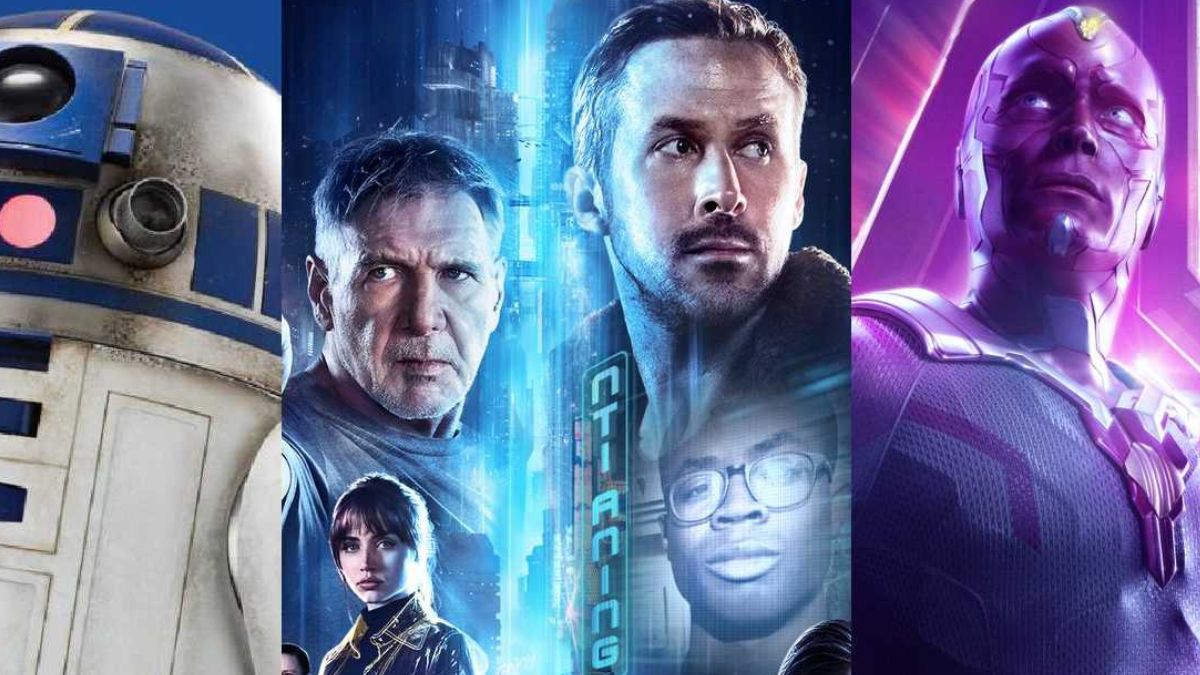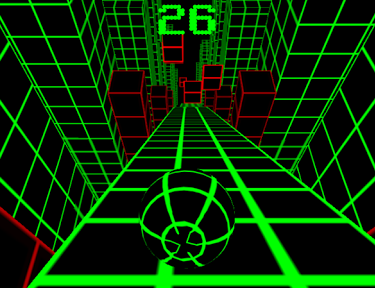Introduction
The film industry is changing fast, and artificial intelligence (AI) is playing a big role in how movies are made. AI is no longer just used for special effects or editing; it’s helping filmmakers in many areas, like writing scripts, choosing actors, and even promoting films. This technology is making filmmaking quicker, cheaper, and more creative. In this article, we will explore how AI is changing the way movies are made, the benefits it brings, and the challenges that come with it.
AI in Scriptwriting

Writing a movie script can take a long time. Traditionally, writers spend months or even years perfecting a story. But now, AI can help speed up the process. By analyzing data from many movies, AI can help writers create ideas, characters, and even dialogue that are likely to be popular with audiences.
Tools like Plotagon and ScriptBook use AI to suggest story ideas, help with character development, and offer suggestions on how to improve a script. These tools use patterns from past successful movies to guide writers.
Benefits of AI in Scriptwriting:
- Faster writing: AI helps writers come up with ideas more quickly.
- Customization: AI can suggest stories based on what audiences like.
- Data insights: AI can help predict how an audience might respond to a story.
Challenges in Scriptwriting:
- Lack of emotion: AI might not capture the emotions that a human writer can.
- Creativity concerns: Some fear that AI might make scripts feel formulaic or unoriginal.
AI in Casting
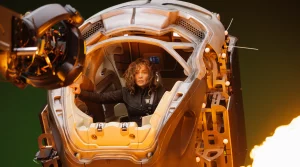
Choosing the right actors for a film is one of the most important decisions a director makes. AI is now helping casting directors find the best actors for the roles. By analyzing past performances and even looking at physical traits, AI can recommend actors who will fit the part.
AI is also helping actors improve their performances. Motion capture technology and facial recognition can make an actor’s expressions and movements more realistic, improving the overall performance.
Benefits of AI in Casting:
- Quicker decisions: AI can find the right actors faster.
- Better choices: AI helps casting directors make informed decisions.
- Improved acting: AI tools can suggest ways to improve actors’ performances.
Challenges in Casting:
- Bias: AI might favor certain types of actors, limiting diversity.
- Personal touch: Some believe casting should be more about feeling and connection than just data.
AI in Visual Effects and Animation
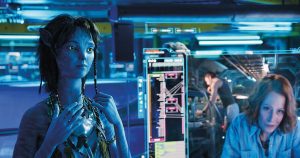
AI is having a huge impact on visual effects (VFX) and animation. With the help of AI, filmmakers can now create more realistic CGI and animations. For example, AI technology like Deepfake can make digital versions of actors that look incredibly real, even allowing them to perform scenes they were never filmed for.
In animation, AI helps create natural-looking human movements and expressions, making animated characters more believable.
Benefits of AI in VFX and Animation:
- Realistic visuals: AI can create lifelike animations and special effects.
- Cost savings: AI helps create effects faster and cheaper.
- New ideas: AI opens up new ways of telling stories through advanced visuals.
Challenges in VFX and Animation:
- Overuse: Relying too much on AI could make visuals feel repetitive.
- Ethical concerns: Creating realistic images of people raises issues about consent and manipulation.
AI in Post-Production

After a film is shot, there’s a lot of work to do in post-production. Editing, sound design, and color correction all take time. AI is making this process faster and easier. For example, AI tools like Adobe Sensei help editors quickly organize footage, choose the best shots, and even suggest how to cut a scene.
In sound design, AI can clean up audio, balance sound levels, and add effects. For color grading, AI can adjust colors to match the mood of the scene or the director’s vision.
Benefits of AI in Post-Production:
- Time-saving: AI automates many tasks, freeing up editors to focus on creativity.
- Consistency: AI ensures that the film has a uniform look and sound.
- Cost savings: AI reduces the time and money needed for editing.
Challenges in Post-Production:
- Lack of creativity: AI might miss the artistic touches that human editors bring.
- Job concerns: Some worry that AI could replace jobs in editing and other post-production roles.
AI in Marketing and Distribution
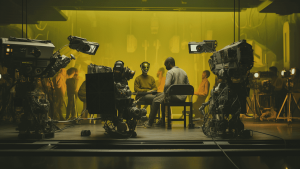
AI is not just changing how movies are made; it’s also changing how they are marketed. Studios use AI to analyze data from social media, search engines, and audience behavior to predict which films will do well in theaters. This helps filmmakers and studios target their marketing to the right audience.
AI is also improving recommendations on streaming platforms. Websites like Netflix and Amazon Prime use AI to suggest movies based on what a viewer has watched before, helping people find new films they’ll enjoy.
Benefits of AI in Marketing and Distribution:
- Targeted marketing: AI helps reach the right people with ads that appeal to them.
- Better predictions: AI can predict which films will be successful based on data.
- Personalized recommendations: AI can suggest movies based on a viewer’s preferences.
Challenges in Marketing and Distribution:
- Privacy concerns: Collecting and analyzing data raises privacy issues.
- Data bias: AI recommendations can sometimes limit people’s choices by focusing only on what they’ve already watched.
AI and Audience Interaction

AI is changing how audiences interact with movies. Some films now let viewers make choices that affect the storyline, thanks to AI. This creates a unique experience where the audience feels like they’re part of the movie. For example, interactive films and virtual reality experiences use AI to adapt to what the audience wants. This could make watching movies more exciting, but it also means that filmmakers must create more content for each possible storyline, which can be time-consuming.
AI-Powered Subtitles and Accessibility
AI is making movies more accessible to people around the world. With AI, subtitles can be created quickly in multiple languages, allowing more people to enjoy films. AI tools can also generate voiceovers or audio descriptions for people with visual or hearing impairments. This makes movies available to a larger audience. However, these tools are not perfect and may sometimes translate or describe things incorrectly, which could confuse viewers.
AI in Predicting Movie Success

Studios are using AI to predict how successful a movie will be before it is even released. By studying past films, audience preferences, and current trends, AI can estimate how much money a movie might make. This helps filmmakers decide on budgets, casting, and even marketing strategies. While this can reduce financial risks, it might also push studios to only make movies that are likely to succeed, leaving less room for unique or experimental films.
AI in Independent Filmmaking
AI is also helping independent filmmakers. These filmmakers often have small budgets and limited resources, but AI tools can make their work easier. For example, AI can help them edit footage, create special effects, or even market their films at a lower cost. This levels the playing field and allows smaller creators to compete with big studios. However, independent filmmakers still need creativity and vision to stand out, as AI alone cannot make a film successful.
AI in Real-Time Editing
Some filmmakers are now using AI for real-time editing during filming. AI can analyze footage as it’s being shot, helping directors make quick decisions about which scenes to keep or reshoot. This saves time and money, as problems can be fixed immediately rather than during post-production. While this is a helpful tool, it might put pressure on filmmakers to make quick decisions without fully considering the artistic aspects of the scene.
AI and Virtual Production
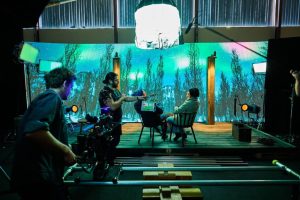
Virtual production is a new method where filmmakers use AI and digital tools to create realistic sets and environments. This allows directors to film in a controlled space while making it look like they’re in a completely different location. AI helps by creating detailed virtual landscapes and adjusting lighting and effects in real time. This saves money on traveling and building physical sets. However, relying too much on virtual production could make some films feel less authentic.
Challenges of Using AI in Filmmaking
Even though AI brings many benefits, there are challenges too. Some people worry that AI will take away creative jobs or make movies feel less personal. For example, while AI can help write a script, it might not capture the emotional depth a human writer can. There’s also the risk of bias, especially in casting, where AI might favor certain types of actors. Privacy concerns are another challenge, especially when AI collects and analyzes data from audiences.
The Future of AI in Filmmaking
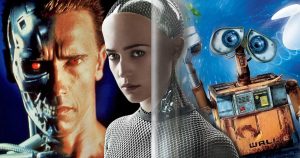
Looking ahead, AI will likely play an even bigger role in filmmaking. We may see entirely AI-generated films, or AI could help create more interactive stories where the audience plays a role. AI will continue to help filmmakers make decisions based on data, making the process more efficient and creative.
However, as AI becomes more involved in filmmaking, it’s important for filmmakers to find a balance. AI should enhance creativity, not replace it. Human touch, emotion, and diversity should still be at the heart of filmmaking.
Analysis of AI’s Impact on Filmmaking
To summarize how AI is affecting filmmaking, here’s an analysis of its benefits and challenges:
| Stage of Production | Positive Impact | Challenges |
|---|---|---|
| Scriptwriting | Faster idea generation, customized stories | Lack of emotional depth, creativity concerns |
| Casting | More efficient casting decisions, optimized performances | Potential biases, loss of personal connection |
| Visual Effects/Animation | Realistic visuals, innovative storytelling | Over-reliance on AI, ethical concerns with digital manipulation |
| Post-Production | Time-saving, consistency in editing and sound | Lack of artistic touch, potential job displacement |
| Marketing and Distribution | Targeted marketing, better film predictions | Privacy concerns, data bias in recommendations |
Comparative Table: Traditional vs. AI-Driven Filmmaking
Here’s a simple comparison of traditional filmmaking and AI-driven filmmaking:
| Aspect | Traditional Filmmaking | AI-Driven Filmmaking |
|---|---|---|
| Scriptwriting | Manual writing, creativity-driven | AI tools help generate and improve scripts |
| Casting | Manual auditions, director’s decisions | AI matches actors to roles based on data |
| Visual Effects | Requires skilled artists, time-consuming | AI creates more realistic effects quickly |
| Editing | Time-consuming, requires manual work | AI automates many editing tasks |
| Marketing | Broad campaigns, general targeting | AI targets specific audiences based on data |

